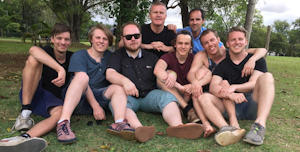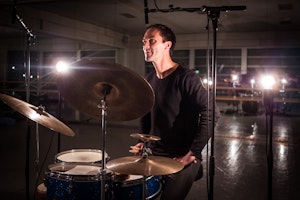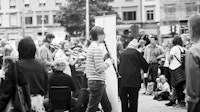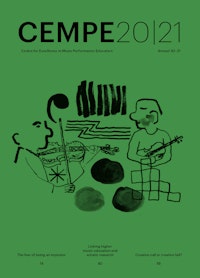Thomas Strønen's group Food consisted of Iain Ballamy on saxophone and Simen Scharning as sound designer, and Extended Ground comprised of six bachelor students from the Norwegian Academy of Music (NMH). They played five concerts in São Paulo and Rio and held two workshops. This is a field report from Strønen about the students’ learning experiences during the trip.
Field Report From Brasil: The Student Becomes the Musician

In the period 17–24 April 2017 Thomas Strønen's group Food and the drum ensemble Extended Ground toured Brazil to great critical acclaim.
The Plot
This project considers how establishing a close relationship between a group of bachelor level music students and an experienced professional ensemble can contribute to the students' musical development and prepare them for a globalised, non-institutionalised career. Furthermore, it also looks at how a direct meeting with the music industry (i.e. promoters, management, venues) can work as a generator to streamline the knowledge you can only gain through experience.
I have noted a tendency for students to fear leaving college and starting their professional carrier due to a lack of knowledge of the practical sides of being a musician. Knowing how to play doesn’t necessarily give you the tools to survive. While some have experience in booking, playing, travelling and meeting agents, most of the students do not. By the same token, I also wanted to investigate their knowledge of people, culture and society and how the students could assimilate in their new environment.
As the hypothesis is subjective, I wanted to examine potential outcomes using a poetic method: “self-conscious participation”.
The Investigation
With its regular hours and safe and organised environment that consistently attends to the students' needs, institutionalised music tuition can give students a somewhat unrealistic conception of what being a professional musician is like.
In an ideal world (maybe) we would be met with all the help we need at all times, but in real life as a musician, improvisation and knowledge of how to deal with spontaneous occurrences are crucial.
Students must experience and learn how to respond to the demands of the industry early on in their studies/careers. Many context-determined cultural idioms have to be learnt through doing. A number of questions were put to the students before the trip:
- What do you do if the non-speaking driver doesn’t know where he´s taking you?
- How do you pack the drum so that it survives the flight?
- Which factors must be considered before leaving the hotel to catch your flight?
- What are your needs for the sound-check, and how do you convey them?
- Who are your contacts in the different places?
- Who in the group oversee the various tasks?
- What do you know about São Paulo, Rio and Brazil in general?
- What is the expected behaviour from you as musicians before, during and after the concert?
The key to a successful concert lies in the preparations – and not only the musical ones. If the logistics don’t work, there may never be a concert.
I also find it important to be aware of the role we have as guests in another country with its values, culture and history. Even though it's pleasing to be an invited celebrity, we can benefit from trying to understand and respect local customs and traditions (as long as they don't compromise our own values).
Within the walls of an institution you learn harmony and its functional theoretical extensions, performance practice, interactions with fellow students and teachers, composition and notation. It is my belief that some learning should be experienced in practice to be able to fully take responsibility and act in the appropriate way.
The film documenting the trip will provide an insight into the students’ thoughts on the experience. Through interviews, the students reveal their lack of tools for handling situations that must be taught through practical experience. Many of the situations came as a surprise to the students, although they are in fact daily occurrences in a professional musicians’ life.
Action
Since early 2016 I had been working to get a group of students to play in Brazil, as I had discovered the similarities between our (Norwegian and Brazilian) music cultures historically and musically. To facilitate this, I used my own ensemble, Food, through a Brazilian management. Food has been an acclaimed jazz group for almost twenty years, having toured Europe, the US and parts of Asia and having released eight records on the prestigious record label ECM Records. The Brazilian management, Desmonta, organised a tour headlining Food with the drum ensemble serving as a support act. We had support from Music Norway and the Norwegian Academy of Music to cover travel costs and hotels. The students were interviewed and filmed to document their reflections and interpretations.

Fieldwork
What did we experience during a week of concerts and workshops in Brazil?
When it comes to the practical sides of musicianship, the conservatoire acts as an artificial arena. Real life is the only natural venue for learning by doing. The learning is based on a wish to master something, and outside motivation is not needed in the same way as when learning theory at college. The concept of learning in anticipation of need is a most effective way of learning.
I discovered that the most efficient way of teaching students the roles and codes of musicianship is to give them responsibility. With minor individual differences, their ambitions are high, as it is obvious that these are skills you must master in order to survive as a professional musician. Also, the group dynamic generates a will to succeed in front of fellow students.
The fact that they engage in something they love doing motivates them to improve even more than one would have hoped for. Not only do they learn from what they experience, they also think about how to improve their own performance. They innovate.
If you want to be able to differentiate various kinds of sushi, you have to eat sushi.
Associate Professor at NMH
Their only reward is the reassurance of gaining new skills and being better equipped to master the career they aspire to.
If you want to detect different nuances, it requires multiple attempts. This makes learning a discovery process exploring how certain things look, feel and is done. The teacher’s role, having prepared the students in advance, would be to be there to guide them to the right experiences, answer questions or ask questions.
Learning by doing uses strategies involving communication, human relations and reasoning. The knowledge is generated when they need it, and people can sometimes explicitly state what they know.
Preparing the Students for Becoming Musicians
In the field, it was interesting to see how natural it felt for the students to turn to the teacher (i.e. me) once there were obstacles. However, the learning curve was steep, and it did not take long before they started to investigate, draw on each other and search for help outside. Most of the situations occurred due to a lack of preparation and could have been avoided by gathering knowledge beforehand. By the end of the tour, the students still needed reminders about trying to conceptualise various circumstances. The narrative approach may slow down the process, but I believe it makes them more independent by the end of it.
One week of touring – meeting various challenges in a new cultural environment without speaking the language – will not prepare you for all the situations you will face as a musician, but it will help developing the necessary tools and start the process. I believe this kind of experience is crucial to preparing students to become musicians.
Slattum, July 27, 2017.




